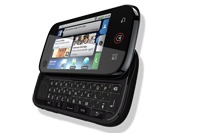Motorola DEXT review
The DEXT is Motorola's first foray into Android territory. Does it work? We review the handset to find out.

We’re still big fans of the DEXT, despite its social networking and consumer-oriented focus. That said, in its present guise, it’s probably better suited to business users who only find themselves out of the office occasionally rather than full-blown road warriors or executives who need simple access to complex data and functions on the move.

Messaging is also made much easier as in a way that lets users "focus on what people have to say instead of how they send it," according to Motorola. In practice, this means messages appear based on whom they're from rather than separated into text, email and so on. It does make keeping track of who said what in conversations that take place over several mediums much easier to digest.
The ability to sync your work/personal calendar with your Google calendar is a bonus so you can see at a glance what you're supposed to be doing and when.
Browsing the web on the DEXT is a pleasant experience that's also quite speedy thanks to an Android HTML webkit-based browser and Wi-Fi and HSDPA connectivity options both supported. While pages render well, there's no support for multi-touch for zooming, which proves a bit of a disappointment.
A range of useful applications are provided out-of-the-box to make life for the busy user much easier, both for work and play. QuickOffice, for example, will help business users review documents and such like on the move, although if they want to edit them too, they'll have to fork out for an upgrade.
Of course, there's also speedy access to the Android market to download the apps of your choice should you not find them already living on the handset from day one.
Customising the DEXT's desktop is easy, achieved simply by pressing and dragging the desired icons around. Haptic feedback assures users that they're command has been met during the process. Indeed, we found the (320x480 pixels) touch screen to be very responsive to all our commands during the test period.
Sign up today and you will receive a free copy of our Future Focus 2025 report - the leading guidance on AI, cybersecurity and other IT challenges as per 700+ senior executives
Maggie has been a journalist since 1999, starting her career as an editorial assistant on then-weekly magazine Computing, before working her way up to senior reporter level. In 2006, just weeks before ITPro was launched, Maggie joined Dennis Publishing as a reporter. Having worked her way up to editor of ITPro, she was appointed group editor of CloudPro and ITPro in April 2012. She became the editorial director and took responsibility for ChannelPro, in 2016.
Her areas of particular interest, aside from cloud, include management and C-level issues, the business value of technology, green and environmental issues and careers to name but a few.
-
 Everything we know so far about the Nike data breach
Everything we know so far about the Nike data breachNews Hackers behind the WorldLeaks ransomware group claim to have accessed sensitive corporate data
By Ross Kelly Published
-
 Business leaders are using AI as a “license to reduce headcount” – new Morgan Stanley research lays bare the impact on UK workers
Business leaders are using AI as a “license to reduce headcount” – new Morgan Stanley research lays bare the impact on UK workersNews Analysis of five sectors highlights an "early warning sign" of AI’s impact on jobs
By Nicole Kobie Published
-
 AI is “forcing a fundamental shift” in data privacy and governance
AI is “forcing a fundamental shift” in data privacy and governanceNews Organizations are working to define and establish the governance structures they need to manage AI responsibly at scale – and budgets are going up
By Emma Woollacott Published
